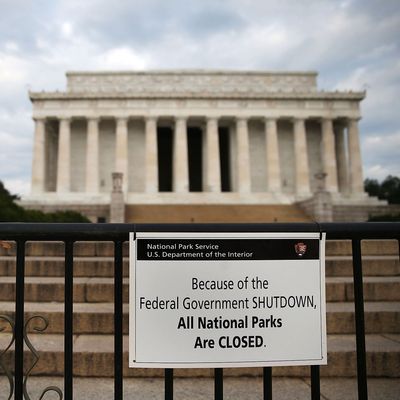
Most of the postmortem accounts of the Republican health-care fiasco look forward to tax reform as the next big challenge for the GOP’s legislative agenda, and there’s some discussion of the argument that taxes should have been Job One from the get-go.
But there’s a rather large pothole in the road to tax reform that could bust an axle if Republicans are not careful: the expiration on April 28 of a short-term appropriations measure that keeps the federal government functioning. This continuing resolution, as it is known, was passed last December to punt disputes over federal funding levels into a GOP Congress that could for the first time since 2006 count on a Republican president for cooperation.
But now the re-funding measure is being thrown into a turbulent environment featuring divided Republicans and emboldened Democrats. And there is no way around the fact that the two issues that led to government-shutdown threats from Republicans in recent years, Planned Parenthood and Obamacare, have not been resolved by separate legislation.
This is the reality Mike Allen is likely reflecting in a dire prediction today:
A top Republican with close ties to the White House tells me that after the GOP failure on healthcare, a government shutdown — looming when a continuing resolution runs out April 28 — is “more likely than not … Wall Street is not expecting a shutdown and the markets are unprepared.”
It’s the long-standing GOP commitment to “defund” Planned Parenthood that is the problem most likely to produce a shutdown. A number of conservatives (including Trump budget director Mick Mulvaney) have pledged never to vote for an appropriations measure that allows federal funds to go to the embattled women’s health organization. So even if the GOP congressional leadership tries to downplay current appropriations by just extending them without cuts to the end of the current fiscal year, there will definitely be cries of fury over Planned Parenthood. And there’s even a possibility that hard-core conservatives could renew the effort they made in 2013 to block appropriations necessary for the administration of Obamacare, now that the program has been left standing.
So the odds are good that whatever the GOP leadership promotes to get over the appropriations hurdle will not include Planned Parenthood money and may include other tasty treats for conservatives to avoid a revolt like the one that defeated AHCA. But unlike the budget-reconciliation bill that protected AHCA from a Senate filibuster, an appropriations bill is regular legislation. And so the odds are pretty good anything other than a straight extension of the earlier continuing resolution will attract a Democratic filibuster, and produce the kind of gridlock that could shut down the federal government for at least a while.
The other complicating factor is that some conservatives could push to implement the kind of big and controversial changes in funding priorities contained in Trump’s budget for the next fiscal year right away, in the current-year appropriations bill. Such a development would make it even harder to get a bill that clears the House without Democratic voters, and could make a Democratic filibuster in the Senate even more likely.
The overriding political consideration is that given their “trifecta” control of the White House and both congressional chambers, Republicans would almost certainly be blamed for any government shutdown on their watch. And that makes Democratic action designed to produce one — whether it’s by denying Paul Ryan any votes in the House to offset conservative defections, or launching a filibuster in the Senate — that much more likely.
It’s certainly a kind of trouble the GOP doesn’t need after the health-care disaster, and as Mike Allen’s quote above indicates, it could most definitely undermine corporate and Wall Street confidence in the new regime’s ability to deliver on its promises.






























